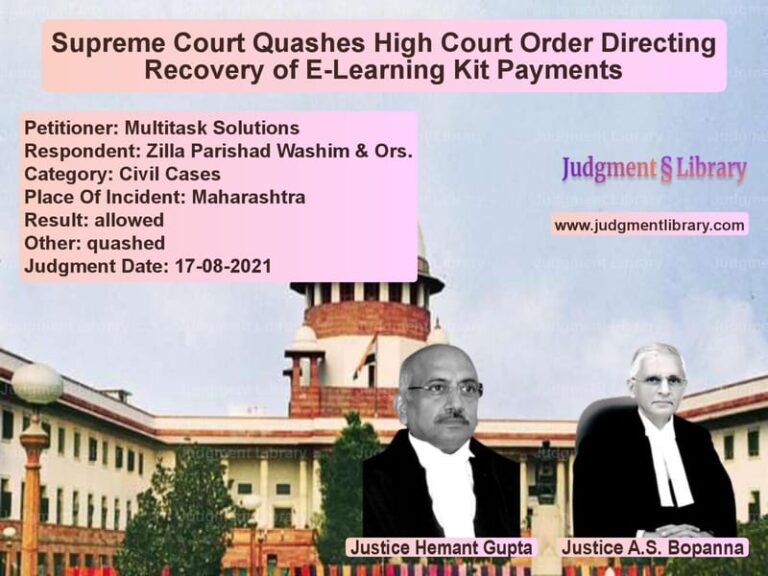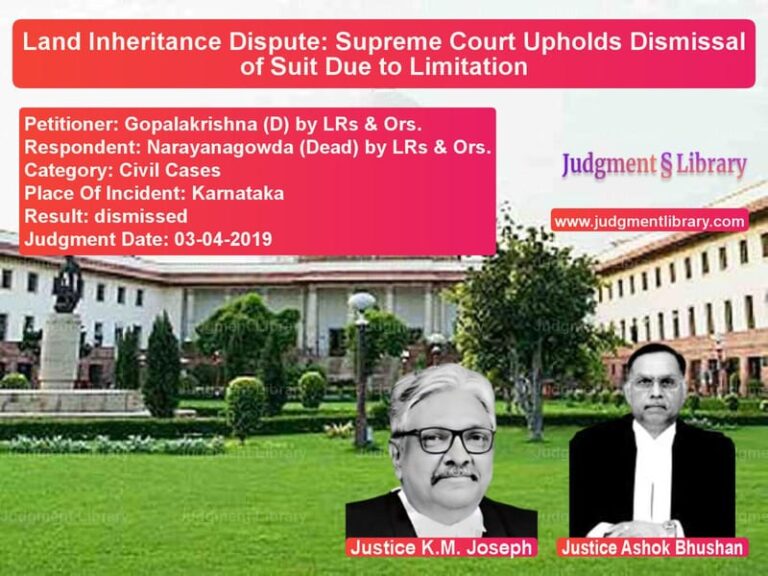Arbitration Clause Interpretation: Supreme Court Rules on MOU Dispute
The case of Shyam Sunder Agarwal v. P. Narotham Rao & Others is a landmark judgment that clarifies the interpretation of arbitration clauses in contractual agreements. The Supreme Court examined whether Clause 12 of a Memorandum of Understanding (MOU) between the parties constituted a valid arbitration agreement. The ruling provides crucial insights into the requirements of an arbitration clause and the role of mediators or escrow agents in contractual disputes.
Background of the Case
The dispute arose out of an MOU dated December 8, 2005, concerning the sale and purchase of shares in M/s Mancherial Cement Company Private Limited. The appellant, Shyam Sunder Agarwal, and the respondents were directors in the company and entered into the agreement to settle internal disputes regarding shareholding and financial obligations.
The key contention in the case was whether Clause 12 of the MOU, which referred to the role of mediators/arbitrators in resolving breaches, constituted a binding arbitration agreement under Indian law.
Arguments by the Parties
Appellant’s Arguments
- The appellant contended that Clause 12 contained all the essential elements of an arbitration agreement, including the words “decision,” “mediators/arbitrators,” and “final and binding on all parties.”
- The clause explicitly mentioned that the mediators/arbitrators would resolve disputes related to breaches of the agreement.
- The presence of a dispute resolution mechanism meant that the MOU contained a valid arbitration clause, making the case eligible for arbitration under the Arbitration and Conciliation Act, 1996.
- The appellant relied on precedents, including K.K. Modi v. K.N. Modi (1998) 3 SCC 573, which laid down the characteristics of a valid arbitration clause.
Respondents’ Arguments
- The respondents argued that the term “mediators/arbitrators” was used loosely and that the individuals referred to in the clause were actually escrow agents appointed to facilitate the completion of the transaction.
- The role of these individuals was limited to ensuring compliance with financial and documentary obligations under the MOU, not adjudicating disputes.
- Other clauses in the MOU, such as Clauses 6, 8, 10, and 11, demonstrated that the escrow agents were responsible for safeguarding documents and payments rather than acting as arbiters.
- The appellant’s inconsistent legal strategy, including approaching the Company Law Board while also seeking arbitration, indicated a lack of commitment to arbitration.
Supreme Court’s Observations
The Supreme Court analyzed Clause 12 in conjunction with the other clauses of the MOU and ruled that it did not constitute a valid arbitration clause.
- The individuals referred to as “mediators/arbitrators” were, in fact, escrow agents responsible for holding and releasing documents and funds as per the agreement.
- The phrase “decision to be final and binding” applied only to the transactional phase and not to formal dispute resolution.
- The role of the escrow agents ended once the transaction was complete, meaning they were not intended to act as arbitrators beyond the execution of the agreement.
- For an arbitration clause to be valid, it must explicitly confer judicial authority on the arbitrators, provide for a hearing process, and allow for a reasoned decision. Clause 12 lacked these essential elements.
- The Court cited the case of P. Dasaratharama Reddy Complex v. Government of Karnataka (2014) 2 SCC 201, which held that mere mention of arbitration-related terms does not automatically make a clause an arbitration agreement.
Final Judgment
The Supreme Court ruled in favor of the respondents and upheld the decision of the lower courts, stating that Clause 12 did not constitute an arbitration agreement. The appeal was dismissed, and the appellant was advised to seek alternative legal remedies.
This judgment reinforces the principle that an arbitration agreement must be clear, specific, and unambiguous. Mere use of arbitration-related terms does not suffice unless the clause explicitly provides for a structured arbitration process with adjudicatory powers.
Petitioner Name: Shyam Sunder Agarwal.Respondent Name: P. Narotham Rao & Others.Judgment By: Justice R.F. Nariman, Justice Indu Malhotra.Place Of Incident: Hyderabad.Judgment Date: 23-07-2018.
Don’t miss out on the full details! Download the complete judgment in PDF format below and gain valuable insights instantly!
Download Judgment: Shyam Sunder Agarwal vs P. Narotham Rao & Ot Supreme Court of India Judgment Dated 23-07-2018.pdf
Direct Downlaod Judgment: Direct downlaod this Judgment
See all petitions in Arbitration Awards
See all petitions in Commercial Arbitration
See all petitions in Enforcement of Awards
See all petitions in Judgment by Rohinton Fali Nariman
See all petitions in Judgment by Indu Malhotra
See all petitions in dismissed
See all petitions in supreme court of India judgments July 2018
See all petitions in 2018 judgments
See all posts in Arbitration and Alternate Dispute Resolution Category
See all allowed petitions in Arbitration and Alternate Dispute Resolution Category
See all Dismissed petitions in Arbitration and Alternate Dispute Resolution Category
See all partially allowed petitions in Arbitration and Alternate Dispute Resolution Category







